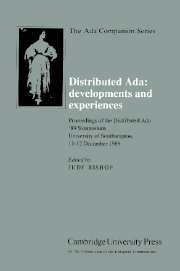 Distributed Ada: Developments and Experiences
Distributed Ada: Developments and Experiences Published online by Cambridge University Press: 13 October 2009
INTRODUCTION
Although the introduction of Ada represented a significant step forward for the developers and users of embedded systems, experience in the use of the language has demonstrated that it has several shortcomings, particularly in the realm of distributed systems. Some of the difficulties with Ada in this respect are caused by relatively minor semantic details chosen without due regard for the properties of distributed systems, such as the semantics of timed and conditional entry calls, and should be easily rectified. Others, however, are of a much more fundamental nature, and are likely to require more significant modifications to the language to overcome them.
One of the main problems of the existing version of Ada is its execution model, based on the notion of a single main program. This model does not carry over well to distributed environments, and tends to reduce the prospects for supporting dynamic configuration and flexible responses to hardware failure.
The purpose of this paper is to outline the difficulties caused by the current execution model of Ada, and to describe the different solutions devised by the European projects, DIADEM, and DRAGON. The first of these was a small project partially funded under the Multi-Annual Programme of the Commission of the European communities, and was completed early in 1987. The second project is partially supported under the Esprit program of the Commission, and is due for completion in the middle of 1990.
To save this book to your Kindle, first ensure [email protected] is added to your Approved Personal Document E-mail List under your Personal Document Settings on the Manage Your Content and Devices page of your Amazon account. Then enter the ‘name’ part of your Kindle email address below. Find out more about saving to your Kindle.
Note you can select to save to either the @free.kindle.com or @kindle.com variations. ‘@free.kindle.com’ emails are free but can only be saved to your device when it is connected to wi-fi. ‘@kindle.com’ emails can be delivered even when you are not connected to wi-fi, but note that service fees apply.
Find out more about the Kindle Personal Document Service.
To save content items to your account, please confirm that you agree to abide by our usage policies. If this is the first time you use this feature, you will be asked to authorise Cambridge Core to connect with your account. Find out more about saving content to Dropbox.
To save content items to your account, please confirm that you agree to abide by our usage policies. If this is the first time you use this feature, you will be asked to authorise Cambridge Core to connect with your account. Find out more about saving content to Google Drive.